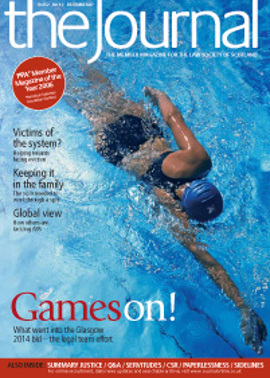Too well known to challenge

Culpable homicide and the ECHR
There have been four ECHR-ish cases recently worth a look. The first, which did not get very far (on the merits, that is: it still had to be heard) is D v HMA 2007 GWD 29-504, in which the presiding judge refused to continue a bail appeal so that the accused might be present, in circumstances where he was represented by fully instructed counsel.
Of rather more substance was HMA v C [2007] HCJ 10; 2007 GWD 29-506. This involved a charge of culpable homicide by supplying a syringe and heroin to a named person knowing that he would inject to the danger of life, and failing to seek prompt medical attention when the person lapsed into unconsciousness. Four devolution minutes were lodged, submitting:
- that the charge was in breach of article 7(1) of the Convention, where death was not in contemplation when the supply was made, and since supply was the act or omission and there could be no attempt at culpable homicide, the death made the crime retrospective;
- that it was not a crime to fail to come to the aid of another;
- that a charge of failing to seek medical attention breached article 7(1) where it was a retrospective attempt to make such conduct criminal; and
- that prosecuting this accused was a discriminatory act in breach of articles 6 and 14 of the Convention where certain medical people who distributed needles were expressly granted immunity from prosecution.
It was held (1) that culpable homicide had been a part of our law since the earliest institutional writers, and the consequence of the minuter’s argument was that the crime did not exist; (2) that there was no question of retrospective criminality when the question answered in Lord Advocate’s Reference (No 1 of 1994) 1996 JC 76 covered what was alleged; (3) that there was no attempt to create a new offence where what was done in argument was to isolate a few words, all of the words used being a necessary party of the narrative and giving fair notice of what was to be proved (the court did reserve its opinion as to whether a failure to come to the aid of another could never be a criminal offence); and (4) that the comparison between the minuter and trained medical people was artificial and the analogy weak.
More on the Convention
Next, there is HMA v McLarty [2007] HCJ 09; 2007 GWD 31-529, which deals with a confiscation order made subject to a plea of guilty to being concerned in the supply of cocaine. A devolution minute was lodged maintaining that the plea was on the basis that the period in the charge was restricted to a few weeks, whereas the prosecutor’s statement gave a period of six years. It was argued inter alia on the minuter’s behalf that article 6 of the Convention included confiscation proceedings and that it would be unfair to have such proceedings which extended in scope beyond the basis of the plea. The minute was refused, the court holding that it was not a question of considering whether it was fair that the issue be addressed at all, arising as it did from substantive law emanating from a democratically elected Parliament, and that if the question for the court were truly whether the Lord Advocate was acting irresponsibly in asking the court to act at all, then properly analysed the question was not whether article 6 had been breached but whether or not so doing would be an abuse of process.
Finally, HMA v P 2007 GWD 29-507 is a plea in bar of trial in respect of an allegation that it had not been brought within a reasonable time in terms of article 6(1). The charges involved incidents alleged to have happened in 1979, 1982 and 1984. It was held that while 11 years might give cause for concern, the fact that the police could not be said to have acted other than with reasonable diligence in investigating the original allegation meant that there had not been unreasonable delay.
Defining “reasonable”
“Reasonable”, in a legal context, is of course one of these words that continues to throw up occasional difficulties. Miller v Jamieson [2007] HCJAC 56; 2007 GWD 32-548 is a Crown appeal against an acquittal on a charge of possession of an offensive weapon, contrary to s 49(1) of the Criminal Law (Consolidation) (Scotland) Act 1995.
It appeared that a police officer had noticed that a person who was acting in a disorderly way had risen gingerly, as if concealing something, and had a bump under his clothing which gave rise to a suspicion that he might have been in possession of an offensive weapon. The subsequent search was ruled not to comply with s 48(1) of the Act and evidence of the results was ruled inadmissible.
In allowing the appeal and granting authority for a new prosecution, the appeal court held that the sheriff had fallen into the error of appearing to consider that the reasonable grounds for suspicion had to be exclusively referable to the subject of the suspicion. While there might be several explanations for what was going on, the possibility of a concealed weapon could be clearly seen as one of several alternative explanations and plainly constituted reasonable grounds for suspicion. It was observed that if the sheriff’s approach were correct, the effectiveness of the statutory provisions would be almost completely undermined.
Still on the subject of “reasonable”, I am not sure how often an appeal on the ground that a verdict could not have been reached by a reasonable jury, properly directed (Criminal Procedure (Scotland) Act 1995,
s 106(3)(b)) has been successful. It seems probable that the scope for this ground is very much restricted to situations in which two or more verdicts which are self-contradictory have been brought in. However the argument in Anderson v HMA [2007] HCJAC 50; 2007 GWD 31-528 seems rather to have been based on the assertion that the jury had believed an incredible witness, in this case the complainer. The appeal court reiterated the well known doctrine that a witness can be believed in whole or in part, and went on to explain that the jury’s decision could not be categorised as lacking a rational basis where it could be rationalised on the view that the jury had accepted the complainer’s account on the core or crucial question of consent while discarding her evidence about prior events.
Pleas not accepted
Another case which leads to the restatement of a longstanding legal principle which may have been temporarily lost sight of is McLean v HMA [2007] HCJAC 51; 2007 GWD 30-517. This was a successful appeal against conviction on the grounds that the jury were misdirected by the presiding judge telling them that they did not require to apply the principles of presumption of innocence or corroboration, by suggesting that it was not for them to consider whether the charge had been proved beyond reasonable doubt, and by directing them that they had to convict in certain terms, which was then contradicted by a reference to the issue of concert.
The Crown conceded at the appeal that the sheriff had fundamentally misapprehended the effect of guilty pleas tendered by the accused to lesser charges (which pleas were not accepted), and had failed to appreciate that there existed a long line of authority to the effect that a plea of guilty which had been tendered and rejected could not be founded on by the prosecutor. It was held that the trial should have proceeded in the ordinary way, with the Crown having to prove its case beyond reasonable doubt on corroborated evidence.
Suspending warrants
The difficulty of looking behind warrants and into the circumstances in which they were granted has often been remarked upon. In McDonagh v Pattison [2007] HCJAC 61; 2007 GWD 34-578 bills of suspension were passed, resulting in initiating warrants being suspended. The warrants had been requested by the procurator fiscal on the basis that the appellant was considered by the police to be a high risk sex offender who would not voluntarily answer a citation. The appellant contended that he had previously been proceeded against by the same fiscal in respect of similar charges, that he had on all occasions attended court, whether cited or ordained, and that previous proceedings had been terminated by the Crown. Accordingly the warrants had been granted on the basis of a statement that was grossly inaccurate. The Crown’s position was that since effect had been given to the warrants already, there was nothing to suspend, and the correct way to proceed was by plea in bar of trial on the ground of oppression.
It was held that it could not be said that there was nothing to suspend, since in most circumstances an accused would not know of a warrant, no matter how defective it was, until the police executed it; that it was doubtful if a challenge to the validity of the warrant could be taken in a court of first instance; and that the warrants having been granted on the basis of information that was wholly inaccurate and misleading, it was clear that the sheriff had been misled into granting warrants that he would not and should not have granted.
See also the case note on page 40 of the PDF download
LAWYER’S NOVEL: A GOOD READ
Scottish comic novels are rare, and good ones about lawyers rarer still, so I was delighted to find that Angus McAllister’s marvellous The Krugg Syndrome, about a young law clerk in the west of Scotland who believes himself to be a vegetable from outer space, can be obtained through Amazon. It is much funnier than the same author’s Scottish Law of Leases, which is, of course, a good book too.
In this issue
- Discounting justice
- Common sense prevails
- Common sense prevails (1)
- Shaping the future
- Working in a one-stop shop
- Christmas lesson
- Games City
- OFT-related FAQs
- Sea change around the globe
- Covering the money gap
- Pre-trial priorities
- Personal touch
- Keeping money clean
- The lions sleep tonight
- Conversion course
- Family law risk management
- Too well known to challenge
- Temp sheriffs immune after all
- Camels and common sense
- Tough at the TUPE
- Are bloggers fair game?
- "This ain't tiddlywinks, mate"
- Scottish Solicitors' Discipline Tribunal
- Website reviews
- Book reviews
- Defining moment
- Clear view
- Joint conference success






